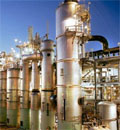Master of Science in Natural Gas Engineering
Program Objectives
The objectives of the graduate studies in the Chemical and Natural Gas Engineering programs are as follows.
- To prepare students for successful careers and major contributions to the natural gas, petroleum, and chemical process industries by instilling in them fundamental concepts as well as practical knowledge of modern engineering to overcome current as well as future challenges of the industries.
- To prepare students for doctoral study in petroleum/chemical or related disciplines.
- To instill in students a sense of responsibility to their profession and to society in general.
The Wayne H. King Department of Chemical Engineering and Natural Gas Engineering offers programs in developing interdisciplinary specialties, as well as in the more traditional areas of Natural Gas and Chemical Engineering.
Several modern engineering buildings contain laboratories, including unit operations, process control, gas measurement and drilling facilities. Excellent computer facilities also are available.
Master of Science Degree
For the Master of Science degree, both Plan I (thesis) and Plan II (non-thesis) are available.
Plan I requires 24 semester hours of course work (18 hours in the major area and 6 hours in a minor area) plus completion of a research thesis.
Plan II requires 36 semester hours of course work, including 21 to 30 hours in the major area and 6 to 15 hours in one or two minor areas. If two minor areas are chosen, at least 6 hours must be taken in each area. Completion of a short research project and report is also required.
Master of Engineering Degree
- The Master of Engineering Degree is a special program intended for practicing engineers.
- It requires 36 semester hours of graduate credit, including 21 hours in the major area, plus an engineering research project and report. Comprehensive oral examinations are required for all degrees.
- Approved minor areas include all engineering disciplines, computer science, mathematics, statistics, chemistry, physics and biology.
Admission
A minimum GRE (verbal + quantitative) score of 295 and, (for international students, a minimum TOEFL score of 550 or ibt 79 or IELTS 6.0) The minimum G.P.A. is 2.75.
Prerequisites
An undergraduate degree in Chemical Engineering, natural gas engineering, petroleum engineering, or a related field. For students whose undergraduate work is in a related field, some undergraduate course work may be required to remove deficiencies in their backgrounds. Such course work will be determined by the graduate coordinator for each program on an individual basis.
Core Course Requirements (15 credits)
- Natural Gas Production and Distribution – NGEN 5325
- Natural Gas Drilling Engineering – NGEN 5327
- Rheology – NGEN 5336
- Natural Gas Processing – NGNE 5360
- Advanced Reservoir Engineering – NGEN 5363
(A grade of B or higher is required in each core course.)
Elective Courses (9 to 18 credits)
- Petroleum Property Evaluation – NGEN 5310
- Advanced Petroleum Refinery Processes – NGEN 5303* Advanced topics in Nat. Gas Eng.
- Pressure Transient Analysis – NGEN 5312
- Quantitative Well-Log Analysis – NGEN 5387
- Separation Processes – NGEN 5309
- Advanced Process Dynamics & Control – NGEN 5361
Thesis and Research
The thesis (Plan I) or research project (Plan II) committee consists of faculty Project Committees: members from the major and minor areas. Members of the committee are selected in consultation with the student's research advisor and the graduate coordinator.
Time Requirements
The Plan II program can normally be completed in one calendar year of full-time study (Fall, Spring and Summer semesters). The Plan I program may require an additional one or two semesters due to the open-ended nature of thesis research.
Departmental Deadlines
Theses and research project reports must be submitted to research advisors with sufficient lead time to allow for revisions and review by committee members. Minimum lead times are typically 6 to 8 weeks for theses and 3 to 4 weeks for research projects. Final deadlines for completed reports are set by the graduate office.
